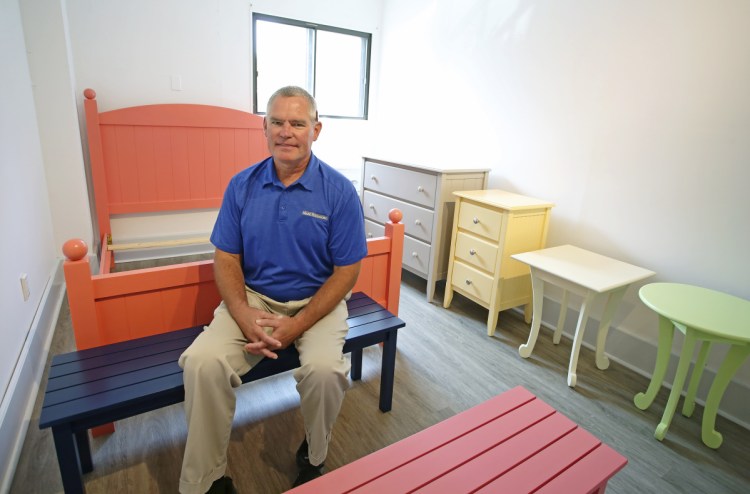SACO — Scott Bogdahn’s face crinkled into a smile as he pressed a piece of wood into the pocket hole machine in front of him and pulled it out to inspect the perfectly cut grooves. He placed the cut piece in a shopping cart at his side, grabbed another piece of wood and started the process again.
For 21 years, Bogdahn has worked in the workshop of Maine Woodworks, building cottage-style furniture that is sold in stores across the Northeast. The 57-year-old Saco resident is a participant in Creative Work Systems, a nonprofit that serves adults with disabilities, and one of the longest tenured employees in the workshop at Maine Woodworks.
“I like building furniture,” Bogdahn said, the smile never leaving his face. “I like working hard.”

Scott Bogdahn carries wood blocks while working at Maine Woodworks, a program of Creative Work Systems that generates revenue by selling handcrafted cottage-style furniture. The company will open a showroom in Saco for the first time to showcase its pieces.
Maine Woodworks is a social enterprise program of Creative Work Systems, an agency founded 51 years ago that serves about 400 adults with disabilities from Augusta to Biddeford. The furniture business has operated quietly in York County for 30 years, first in the Lincoln Mill in Biddeford and currently from a nearly 23,000-square-foot workshop in Saco. Now the program is poised for growth after a yearlong effort to rebrand its products, expand and modernize furniture designs and find efficiencies in production.
It will also open for the first time a showroom adjacent to the workshop to display samples of the benchcrafted furniture pieces distinguished by their simple design and bright pops of color. Maine Woodworks will host its first pop-up sale on Sept. 14 and 15 on Lund Road in Saco.
Maine Woodworks started in 1991 with a dual purpose: employ people with disabilities and generate profit for Creative Work Systems to further its social mission. But the business didn’t start out profitable. For the first few years, employees made unfinished pine furniture, and a limited market and high shipping costs hindered the program’s ability to make money.
In the early 2000s, Maine Woodworks shifted to building painted furniture after the staff realized there was a demand in the market for cottage and Shaker-style furniture.
“We started dabbling with those looks and have been developing products ever since,” said Dave Gallati, director of operations.
In September 2001, Maine Woodworks brought its new designs to a furniture trade show in Massachusetts.
“We stuck out like a sore thumb because everything else was a natural wood,” Gallati said. “We had all these bright colors.”
Buyers from Boston Interiors, a furniture store chain in Massachusetts, were excited about the products and asked Gallati if Maine Woodworks made any beds. Back at the workshop, employees made a prototype and a few months later Boston Interiors placed its first order. That bed design is still the chain’s best seller from Maine Woodworks line, Gallati said.
“That’s what allowed us to get to the point where we were profitable,” he said.
Last year, Maine Woodworks produced about 3,400 pieces of furniture – each made to order – and generated $1.25 million in gross sales to retailers. The largest pieces of furniture – dressers, armoires and beds – retail for over $1,000. All profits, or about 15 percent of gross sales, go back into Creative Work Systems programs. In 2016, the nonprofit agency reported $15.48 million in revenue and $15.4 million in expenses, according to tax filings.
“Gross sales (at Maine Woodworks) have gone up steadily over the past few years,” said Matt Hickey, chief operating officer for Creative Work Systems. “We’re growing the business slowly. We want to do it thoughtfully. We really want to invest in this because we want to diversify our revenue stream.”
Employees make between $10.50 and $20 an hour, plus benefits, according to Creative Work Systems.
Gallati said even if Maine Woodworks only broke even, he’d consider it a success because of the opportunities it provides for adults with disabilities to learn new skills, earn a steady paycheck and take pride in their craft.
“Our participants derive a profound sense of satisfaction and pride when they are able to be a productive citizen and go to work to earn a paycheck,” said Heidi Howard, executive director of Creative Work Systems. Bogdahn, who loves laughing with his co-workers, earns enough money through his part-time job to treat his girlfriend to a doughnut every Friday and travel to places like Alaska. His co-worker and fellow Creative Work Systems participant Tina Stevens, who works in the sand pit preparing pieces of furniture to be painted, doesn’t hesitate to describe her favorite part of the job.
“I like getting paid,” said Stevens, who is about to turn 36 and lives in Arundel.
Lead assembler Bill King, who has worked at Maine Woodworks for nearly 20 years and is now semiretired, said he was drawn to his job at the agency because he wanted to work with people with special needs. He finds satisfaction in designing and crafting pieces of furniture by hand, but also in the connections he has made with his colleagues, regardless of their abilities.
“There is a lot of respect here,” he said. “It’s never felt like them and us. It’s all just us.”
Send questions/comments to the editors.



